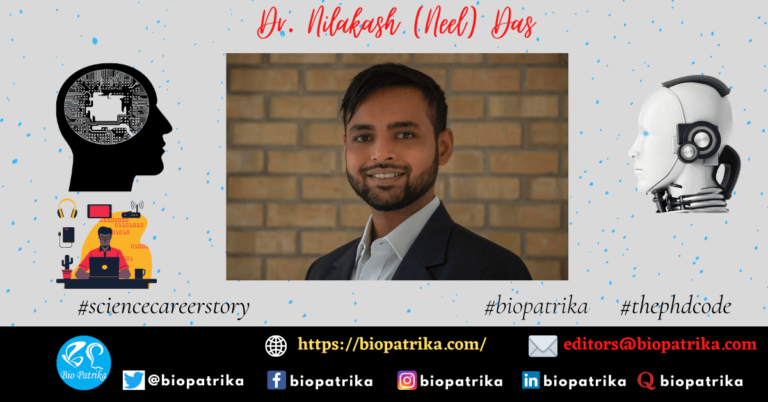Nilakash Das: The Offshore Engineer Who Became an AI Scientist
Dr. Nilakash (Neel) Das is clinical data scientist, whose work lies at the intersection of artificial intelligence and respiratory medicine. As a budding researcher, he has co-authored more than 15 scientific publication. He is also an inventor of two patented algorithms for respiratory diagnostics, and is a recipient of several clinical science awards. Neel completed his bachelors from Indian Institute of Technology, Kharagpur and his masters from Technical University Delft in Netherlands. Presently, he works as a post-doctoral researcher at the laboratory of respiratory medicine and thoracic surgery at KU Leuven, Belgium. He also collaborates extensively with ArtiQ, a spin-off company of their laboratory, in translating AI research into clinical practice.

Career Story
In another lifetime, almost six years ago, I was designing oil platforms and vessels. Little did I imagine then that my life was about change its course. I could feel the drift, my conscience plunging into an internal turmoil that the work I did was irreconcilable with the global havoc wrecked by climate change. Therefore, I just jumped ship after spending almost a decade in that field.
Around the same time, the real potential of artificial intelligence (AI) was starting to unravel. Rapid developments in deep learning, which had burst into public consciousness such as Alexnet(Krizhevsky et al. 2013), signalled the dawn of a new era. Algorithms were now capable of automating tasks that otherwise require the quintessential human perception. In-fact, I even tried some of my half-baked AI ideas in master’s thesis not to the amusement of my supervisors who were classical physicists.
I knew, in my heart of hearts, that a doctoral apprenticeship in applied AI in medicine, was the perfect opportunity to learn and to make a meaningful contribution to improve human lives. It would have allowed me to take a deep dive into the exciting world of data science. These are good thoughts to have. But why would a field as conservative as medicine would accept me when I have ‘oil’ on my hands?
In the summer of 2016, my co-promotor had advertised a position that he was looking for a PhD candidate to build mathematical models on spirometry (a medical test to monitor respiratory health). I had no idea what spirometry was, but that did not stop me. That was the only position I had applied that summer, and I was overjoyed when I received a call for an interview.
I clearly knew that there were candidates who were far more qualified. To ‘sell’ my engineering skills, I came prepared with a few slides on how to fit a non-linear model on observed lung pressure-volume loops (although I had no idea then, on the physiological mechanism!). I vividly remember that joyful moment when I received an email congratulating me! It had come after a long time of stressing about my future, and my dwindling finances. Years later, my co-promotor confided to me that he did not consider my CV initially as it was so alien to the respiratory field, only to have been convinced by a friend of his to take a second look as I had some mathematical skills. I thank that person whole-heartedly!
“As I reflect on my PhD journey, I feel that it was the best decision I have ever made in my life.“
However, the PhD journey was never a smooth ride. In the beginning, the learning curve was overwhelming. Not only I had to educate myself on classical statistics and AI, I also had to soak in an enormous body of literature on lung physiology and respiratory medicine. I am indebted to all the amazing online resources and MOOCs that made my ride much smoother. Without these resources, I shudder to think if I could have even completed my PhD.
Nonetheless, real challenges arose when the time came to communicate my results. Initially, my presentations were highly technical/mathematical which would amuse or even frustrate my colleagues, who were mostly clinicians and biologists. It was the same story with my research manuscripts that were being rejected by one journal after another. It was at these lowest moments that my supervisors played a big role in shaping my attitude. They taught me how to transcend from thinking only about the technical facets of an algorithm, to deeply caring about the clinical aspects as well. I also attended countless presentations to understand the nuances of scientific communication. This led to a dramatic transformation in my approaches, resulting in over 15 peer-reviewed articles (including Nature), 2 patents, 3 clinical science awards and several public presentations.
As I reflect on my PhD journey, I feel that it was the best decision I have ever made in my life. What started out as an avenue to learn more about AI, became much more. I learnt to do science. Asking the right questions, translating a gut feeling into a hypothesis, using data to prove or disprove it, has been an exercise of enormous intellectual stimulation. It imbibed in me the scientific rigors of analysing, interpreting, arguing and communicating clearly and logically. The most important of all, it taught me to be humble about the fact that I know only an infinitesimal amount within the infinitely large corpus of knowledge. An opportunity, such as a doctoral apprenticeship, in which my contribution led to a minuscule gain in the understanding of human health, gives me immense pleasure.
Edited by: Nivedita Kamath
Biopatrika: Bringing Science to Society
© Biopatrika 2023 All Rights Reserved.
